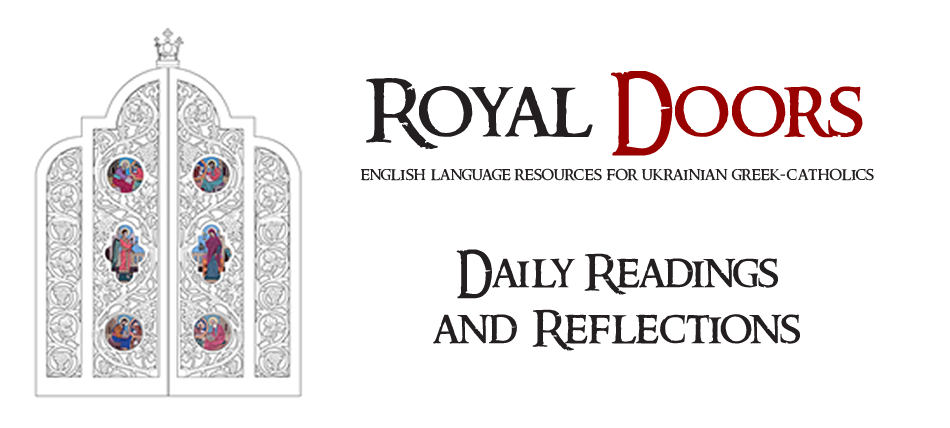by Brent Kostyniuk
We give You thanks, O invisible King, for by Your infinite power You created all things and, in Your great mercy, brought all things from nothingness into being.
Divine Liturgy of St. John Chrysostom
Mercy is central to our Faith. So central, in fact, that Pope Francis made it the theme of an Extraordinary Holy Year which began on Tuesday, December 8, 2015, the Feast of the Immaculate Conception [in the Roman Catholic Church]. This is the first Holy Year to celebrate, not an anniversary of some kind, but the attribute of God the Father which is most exalted in both the Old and the New Testaments. The Pontiff initiated the Holy Year with these words: “I have decided to announce an Extraordinary Jubilee which has at its centre the mercy of God. It will be a Holy Year of Mercy. We want to live in the light of the word of the Lord. ‘Be merciful, even as your Father is merciful.’” Pope Francis also spoke of how God’s mercy overcomes sin. “When faced with the gravity of sin, God responds with the fullness of mercy. Mercy will always be greater than any sin, and no one can place limits on the love of God who is ever ready to forgive… God who consoles, pardons, and instils hope.”
For Ukrainian Catholics, calling on God’s mercy is a recurring event. Indeed, throughout the Divine Liturgy of St. John Chrysostom, the faithful respond to the ektenias (Greek – diligence) [NOTE: In the West, the word litany (Greek – an entreating) is used in the same context as ektenia] with “Lord have mercy.” These words are repeated over 40 times throughout the Liturgy, as a heartfelt plea for God’s indulgence on the many petitions the priest makes on our behalf.
“Lord have mercy” as used in the Liturgy is a translation of the Ukrainian Hospody pomylui. Their original meaning conveys a richer, deeper sentiment than the very commonly heard English words. In his book Life in Abundance Fr. Bernard Dribnenky, OSBM, explains the significance of the original. “Lord, have mercy, or better still, Hospody pomylui. The latter expression says much more than the former one. Hospod’ is a Church Slavonic (an ancient liturgical language now used only occasionally) for Lord, a title which belongs originally to the Risen Christ. ‘Therefore God has highly exalted him and bestowed on him the name which is above every name, that at the name of Jesus every knee should bow, in heaven and on earth…and every tongue confess that Jesus Christ is Lord, to the glory of the Father’” (Phil 2:6-11).
“Pomylui is derived from the Church Slavonic – Mylouvaty – which means to love. Like Amen, pomylui is impossible to translate literally into English; it thus requires an entire sentence: Lord, forgive me, because you love me. In other words, God forgives us not because we repent – we repent because God loves us.”
In the Prayer before Communion, sometimes referred to as the Byzantine Act of Contrition, we echo the Publican’s words as we prepare to partake of the Holy Eucharist. “God be merciful to me a sinner. God cleanse me of my sins and have mercy on me. I have sinned without number, forgive me O Lord.” Only then do we approach to receive the Body and Blood of Christ “for the forgiveness of sins and life everlasting.”
Calling on God’s mercy is also central to the Jesus Prayer. One of the hallmarks of Eastern spirituality is meditation, a discipline brought to near-perfection by the Desert Fathers and Mothers. The Jesus Prayer is a short repetitive prayer, which is profound and deeply mystical. It expresses much of our Christian belief, including the need to be humble before God. Although there are minor variations, a common form of the prayer is “Lord, Jesus Christ, Son of the living God, have mercy on me a sinner.” The words stem from a number of biblical passages. It was Peter who first acknowledged Jesus. “Simon Peter replied, ‘You are the Christ, the Son of the living God’” (Matthew 16:16). In the parable of the Publican and the Pharisee it is the Publican’s prayer which is pleasing to God. “Lord have mercy on me, a (in some translations the) sinner” (Luke 18: 13). Also in Luke, Jesus encounters ten lepers who call out to Him from a distance. “Jesus, Master, have mercy on us” (Luke 17:13).
Finally, as the Liturgy comes to its conclusion, the faithful are left with yet one more reminder that our faith is based on Divine compassion. “Christ our true God, risen from the dead, through the prayers of His immaculate Mother, of our father among the saints John Chrysostom, archbishop of Constantinople, and all the saints, will have mercy and save us, for He is good and loves mankind.”
This piece first appeared in The Prairie Messenger. Reprinted with permission.

